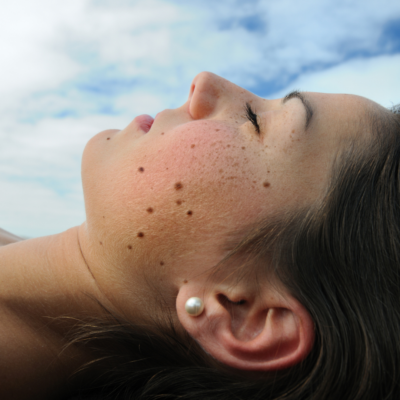
Dry Skin? Or Is It Eczema? What You Need to Know Now
October is National Eczema Month. “So, what does that have to do with me?” you may think. Well, you might be one of 30 million Americans with eczema and not even know it! Eczema, by the way, worsens if left untreated. It can often look like run-of-the-mill dry skin and takes a board-certified dermatologist or advanced practitioner to diagnose it. Sometimes, even a primary care doctor may not recognize it.
As licensed skin experts, we would much rather tell you that you do not have eczema and send you on your way with some over-the-counter treatment suggestions for dry skin. However, if eczema is what you have, we would prefer that you get it diagnosed and start treatment before it progresses.
Eczema is also known as atopic dermatitis. There are different types of eczema. All eczema types are rooted in the immune system taking its job a little too far and overreacting. Below you’ll find an overview of eczema symptoms and treatments.
How to Tell You May Have Eczema
Eczema can impact your life in ways you may not realize. It could affect the quality of your sleep because of persistent itch. It could also keep you from wearing certain clothes because you want to cover up rough patches of skin.
Here are some telltale signs of eczema. You may have one or more of the following symptoms:
- Sudden flareups when the condition becomes worse
- Intense and persistent itch you have to scratch
- Patches of scaly and inflamed skin
- Itchy, painful blisters
- Skin that cracks and bleeds or oozes and crusts over
Over time and repeated outbreaks, skin on the affected areas can become thick and leathery. This is why it is in your best interest to seek treatment early for this condition.
How We Treat Eczema
While the underlying causes of eczema can vary from person to person with genetics, stress, allergic reactions to foods, cosmetics, detergents or seasonal changes and other factors triggering flareups, the treatment modalities for symptomatic relief follow consistent paths. While we work with you to discover the cause of your eczema, we will start you right away on a treatment plan to alleviate your symptoms. Your treatments can include the XTRAC® Excimer laser, UVB light therapy and/or prescription medications.
XTRAC Excimer Laser
The XTRAC® Excimer laser system provides the latest advancement in eczema treatments. By aiming a beam of laser light transmitted through a high-tech fiber-optic delivery system, XTRAC® can clear unsightly and uncomfortable eczematous patches quickly and effectively. Because it concentrates light on active lesions, it avoids the risk of damage to healthy surrounding skin.
If we suggest this as a treatment option for you, we will first test your skin to determine your optimum dosage level. Then, the laser will be applied to the affected area at your determined dose. This only takes a few minutes, depending on the areas to be treated.
For patients with small patches of eczema, this laser allows for quick, effective, and painless therapy typically in several twice weekly sessions with many months afterwards in remission. Results will vary.
Narrow Band UVB
Phototherapy treatment for eczema can treat large areas of skin more swiftly than oral or topical medications and without their possible side effects. During phototherapy sessions, a device emitting rays of narrow band UVB light targets the area of the body being treated. A session takes minutes, and patients can receive treatment several times a week.
By eliminating harmful UV wavelengths, this technology allows higher intensities and longer exposures so patients can receive maximum beneficial results from phototherapy.
Narrow Band UVB is a well-established therapy with an impressive track record of success on thousands of patients.
Prescription Medication
Although eczema can seem like routine dry skin, it isn’t. Ordinary creams and lotions for dry skin not only may not help, they could even aggravate eczema if an ingredient causes an adverse reaction. That is why it is important to have your California Skin Institute dermatologist recommend specially formulated emollients and cleansers to rebalance, calm, enrich and protect your skin.
We can also work with you to suggest lifestyle changes to eliminate or reduce your exposure to possible irritants that may potentially trigger eczema outbreaks.
If need be, we can also prescribe topical or oral corticosteroids. Corticosteroids work by decreasing inflammation and quelling the immune response. However, like most medications, it can have possible side effects that your dermatologist will review with you.
While eczema can’t be cured at present, with California Skin Institute’s expert care, your eczema can be diagnosed, analyzed and treated to significantly reduce symptoms and help you live your best life possible. Request an appointment today.



 / 291 Reviews
/ 291 Reviews